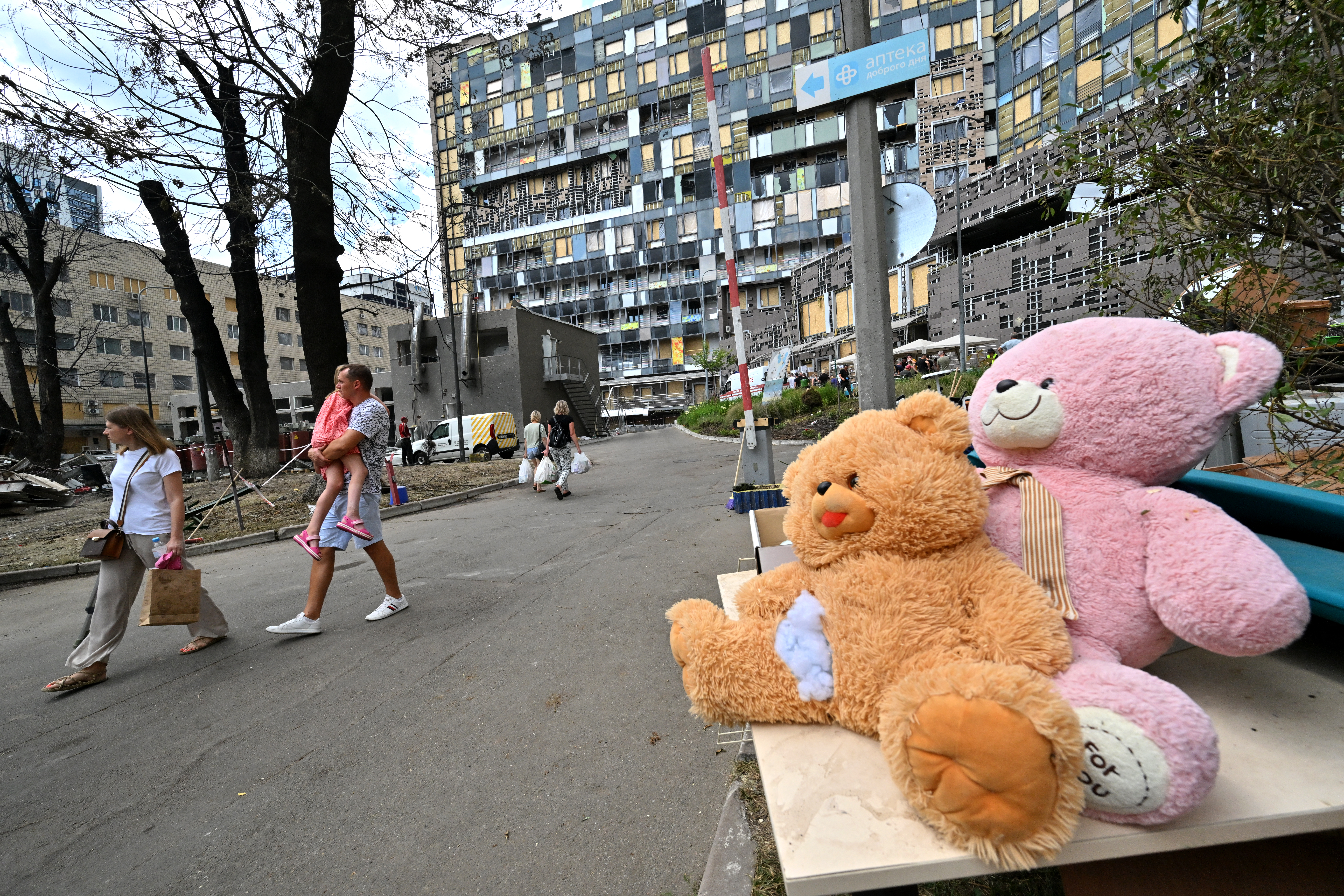
A man carries his daughter in Okhmatdyt, the biggest children’s hospital in Ukraine, in Kyiv on July 12, 2024, amid Russian invasion in Ukraine. The cruise missile slammed into the Okhmatdyt children’s hospital in Kyiv leading the toxicology wing to collapse and damaging large portions of surrounding buildings that housed several different medical departments. Agence France-Presse
KYIV — Antonina Malyshko teared up when recounting the Russian missile strike that hit the Kyiv children’s hospital where her six-month-old baby was being treated for cancer.
The missile hit as she was walking down the corridor to the shelter of Okhmatdyt hospital, where baby Martin has been since being diagnosed with liver cancer when he was two months old.
“I thought he would cry like other children but he just looks at me like that, sucking on the pacifier.”
READ: Russia’s heaviest bombardment of Kyiv in 4 months hits children’s hospital
“He grabbed me tightly and that’s it, I held him, and we were like that the whole time, he was calm,” she said.
She was looking at Martin now peacefully sleeping, his pacifier falling off, while on blood transfusion at the clinic where he was moved after the strike.
A cruise missile on Monday slammed through Okhmatdyt’s toxicology department and damaged large portions of the surrounding buildings of the clinic treating about 600 patients, provoking international condemnation.
It also upended the precarious path to recovery of children who, like Martin, were already facing a tough fight for their lives as they battle cancer.
READ: Mourning in Kyiv as rescuers clear rubble from children’s hospital
“This child needs treatment. And not only this child: there are many children with different diseases. When attacks like these happen, you just don’t understand how that will be possible,” Malyshko, 33, said.
‘No break’
Photos of doctors in bloody robes and cancer patients being treated outside the bombed clinic triggered outrage.
Within an hour of the strike, the National Cancer Institute sent a team to take in some children and avoid the scariest scenario: an interruption of treatment.
The Institute’s Director, Olena Yefimenko, said all the children in their care were in a stable condition.
“There was no break in treatment, they received therapy, even if it was suspended for just a few hours during the explosion, during this tragedy,” she told AFP.
Two children who were in a serious condition before being transferred to other hospitals died, but it was unclear if their deaths were linked to the attack.
Yefimenko’s hospital was busier than usual but she said it had quickly adapted to accommodate around 30 new patients.
“We’ve already been taught by the war,” she said.
Among the transferred was 13-year-old Dmytro, suffering from sarcoma, who was with his mother Iryna Vyshnikina.
“If we hadn’t come out, we wouldn’t exist anymore,” Dmytro said through his surgical mask.
While his mom spoke to AFP, Dmytro was on his phone scrolling through the DeepState interactive map that shows the operations of the Russian and Ukrainian army.
“It’s okay, Dima, we came out and everything is fine,” his mother reassured him.
While AFP was visiting the Cancer Institute, doctors learned that most of the patients would be moved back to Okhmatdyt in the coming days.
Vyshnikina was hoping to come back to the clinic where she and Dmytro had formed their “own kind of family” with other patients.
‘Blood all over the stairs’
Another mother, 24-year-old Maryna Shchomak, said she was shocked when she returned to the hospital the day after the strike.
“There was blood all over the stairs. It felt like such a dissonance. Everything was fine there before. You were used to the normal picture. And then you enter this chaos,” Shchomak said.
The frenzy of the first days, when the hospital was full of volunteers helping to clear up the rubble, has subsided.
But it will take a huge effort to rebuild — according to the Ministry of Health, the hospital needs 400 million hryvnias ($9.7 million) in equipment alone.
A few hundred people, including medical staff bearing bruises and cuts, gathered for a concert in memory of the victims under heavy heat on Friday.
The attack killed two adults, nephrologist Svitlana Lukyanchuk and a visitor.
Orthodox clerics began the ceremony with a prayer honoring the victims, whose photos stood on the ruins of the toxicology department.
The crowd then turned around to face the orchestra that had set up on a debris-covered slope, in front of shrapnel-ridden hospital blocks.
The orchestra was led by Herman Makarenko, who said the ensemble tried to convey the feeling of constant danger that had befallen Ukraine since Russia launched its full-scale invasion.
Back at the National Cancer Institute, Malyshko struggled to feel safe after seeing a missile fall on the children’s hospital, which she had considered a safe haven.
“You don’t know where and at what moment they can strike. You don’t know what to expect and you can’t even make out the logic of it all,” she said.